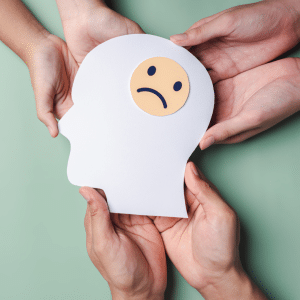Overcoming the Fog: Exploring the Link Between Anxiety, Depression, and Memory Issues
Maddison Henley PA-C

It’s well known that mental health issues like anxiety and depression can have a profound impact on our lives. However, something that people may not be aware of is the potential impact these conditions could have on our memory. If you’ve found yourself experiencing symptoms like forgetfulness or difficulty recalling information, your anxiety or depression could be the culprit.
The Impact of Anxiety on Memory
Ever had a crucial exam looming, but find your thoughts in a state of chaos, unable to grasp onto relevant information? Or experienced a particularly stressful situation, only to find details of the event fuzzy when regenerating them later? That could be anxiety playing tricks on your memory.
Research has found that heightened anxiety can affect memory function. In other words, when you’re “in the zone” of distress, your brain prioritizes dealing with the perceived threat over forming and storing new memories. That’s why you might find it harder to remember information or events that occurred during periods of intense anxiety. Think of it like this: your brain is a processor, and under normal circumstances, it can efficiently handle multiple tasks, including learning new information and storing it in memory.

However, when anxiety strikes, much of the brain’s resources are diverted to dealing with the perceived threat. As a result, other functions like memory formation may get less attention. It’s important to highlight the intricate relationship between anxiety and memory. Short-term anxiety can hinder the process of forming and recalling memories. However, if anxiety is sustained over a longer period, it could lead to more permanent effects on cognitive functions, including persistent issues with memory.
Navigating Through the Cloud of Depression
Just like anxiety, depression can also lead to memory problems. Those living with depression might find themselves in a constant haze, struggling to recall daily events or important information. The scientific explanation behind this is pretty straightforward.
Research on depression has shown that it can shrink the hippocampus — a region of the brain associated with emotion, learning, and memory. Consequently, reduced hippocampal size can lead to memory impairment.
Moreover, depression often gives rise to concentration issues, which in turn hampers the memory formation process. That’s why individuals battling depression often experience noticeable difficulties with focus and memory recall.

Managing Mental Health for Better Memory
Awareness is the first step toward understanding and managing these complexities. So, if you or a loved one are grappling with unexplained memory troubles alongside anxiety or depression, consider seeking professional advice.
Specific treatments, psychotherapy, or medications can help manage these mental health conditions and, in turn, mitigate associated memory troubles. Mental health professionals can also suggest cognitive exercises and lifestyle changes designed to enhance memory function.
In the meantime, taking care of your mental health is crucial. Ensuring a healthy diet, regular physical activity, quality sleep, and lowering stress full activities can aid in managing your mental health conditions. Remember, cognitive impairment is not a failure. It’s simply another manifestation of anxiety and depression — and it’s possible to improve with the right assistance and care.

The connection between mental health and memory is profound; however, not every instance of forgetfulness should be ascribed to anxiety or depression. Numerous factors, including sleep quality, diet, age, and general mental health, all play a role in our memory performance. Nevertheless, it’s crucial to acknowledge the impact anxiety or depression can have on memory. This understanding can aid in identifying when mental health is potentially interfering with cognitive abilities and signal the need to seek professional assistance.
In the light of understanding and managing mental health better, remember that a mind burdened by anxiety or depression shouldn’t feel alone. Reach out, seek help, speak about it, for there is always a way through the fog towards clarity and well-being.
Still struggling or need further advice? Don’t hesitate to book an appointment with one of our clinicians today. Your mental health matters, and reaching out for assistance is the first step in the right direction.
Responsibly edited by AI
Other Blog Posts in
Animo Sano Psychiatry is open for patients in North Carolina, Georgia and Tennessee. If you’d like to schedule an appointment, please contact us.
Get Access to Behavioral Health Care
Let’s take your first step towards. Press the button to get started. We’ll be back to you as soon as possible.ecovery, together.




